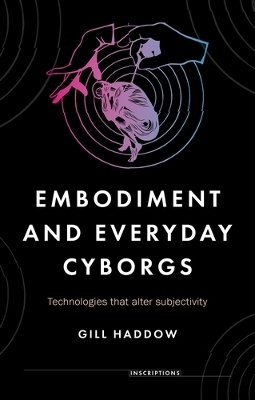
Embodiment and Everyday Cyborgs
Technologies That Alter Subjectivity
Seiten
2021
Manchester University Press (Verlag)
978-1-5261-1418-1 (ISBN)
Manchester University Press (Verlag)
978-1-5261-1418-1 (ISBN)
Implanting the human body with human/animal organs or implantable devices not only changes what you are but also changes who you are. -- .
Your organs are failing and require replacement. If you had the choice, would you prefer organs from other humans or non-human animals, or would you choose a ‘cybernetic’ medical implant?
Using a range of social science methods and drawing on the sociology of the body and embodiment, biomedicine and technology, this book asks what happens to who we are (our identity) when we change what we are (our bodies)? From surveying young adults about whether they would choose options such as 3-D bioprinting, living or deceased human donation, or non-human animal or implantable biomechanical devices, to interviewing those who live with an implantable cardiac defibrillator, Haddow invites us to think about what kind of relationship we have with our bodies. She concludes that the reliance on ‘cybernetic’ medical devices create ‘everyday cyborgs’ who can experience alienation and new forms of vulnerability at implantation and activation.
Embodiment and everyday cyborgs invites readers to consider the relationship between personal identity and the body, between humans and non-human animals, and our increasing dependency on ‘smart’ implantable technology. The creation of new techno-organic hybrid bodies makes us acutely aware of our own bodies and how ambiguous the experience of embodiment actually is. It is only through understanding how modifications such as transplantation, amputation and implantation make our bodies a ‘presence’ to us, Haddow argues, that we realise our everyday experience of our bodies as an absence.
An electronic edition of this book is freely available under a Creative Commons (CC BY-NC-ND) licence. -- .
Your organs are failing and require replacement. If you had the choice, would you prefer organs from other humans or non-human animals, or would you choose a ‘cybernetic’ medical implant?
Using a range of social science methods and drawing on the sociology of the body and embodiment, biomedicine and technology, this book asks what happens to who we are (our identity) when we change what we are (our bodies)? From surveying young adults about whether they would choose options such as 3-D bioprinting, living or deceased human donation, or non-human animal or implantable biomechanical devices, to interviewing those who live with an implantable cardiac defibrillator, Haddow invites us to think about what kind of relationship we have with our bodies. She concludes that the reliance on ‘cybernetic’ medical devices create ‘everyday cyborgs’ who can experience alienation and new forms of vulnerability at implantation and activation.
Embodiment and everyday cyborgs invites readers to consider the relationship between personal identity and the body, between humans and non-human animals, and our increasing dependency on ‘smart’ implantable technology. The creation of new techno-organic hybrid bodies makes us acutely aware of our own bodies and how ambiguous the experience of embodiment actually is. It is only through understanding how modifications such as transplantation, amputation and implantation make our bodies a ‘presence’ to us, Haddow argues, that we realise our everyday experience of our bodies as an absence.
An electronic edition of this book is freely available under a Creative Commons (CC BY-NC-ND) licence. -- .
Gill Haddow is a Senior Lecturer in Science, Technology and Innovation Studies at the University of Edinburgh -- .
Introduction: Animal, mechanical and me: Technologies that alter subjectivity
1 Ambiguous embodiment and organ transplantation
2 Choosing between animal, mechanical and me?
3 Reclaiming the cyborg
4 Everyday cyborgs and the love-hate cybernetic relationship
Conclusion: Towards a future of techno-organic hybridity
Index -- .
| Erscheinungsdatum | 20.05.2021 |
|---|---|
| Reihe/Serie | Inscriptions |
| Zusatzinfo | 2 black & white figures; 2 tables |
| Verlagsort | Manchester |
| Sprache | englisch |
| Maße | 138 x 216 mm |
| Gewicht | 417 g |
| Themenwelt | Informatik ► Theorie / Studium ► Künstliche Intelligenz / Robotik |
| Studium ► 1. Studienabschnitt (Vorklinik) ► Med. Psychologie / Soziologie | |
| Naturwissenschaften | |
| ISBN-10 | 1-5261-1418-6 / 1526114186 |
| ISBN-13 | 978-1-5261-1418-1 / 9781526114181 |
| Zustand | Neuware |
| Haben Sie eine Frage zum Produkt? |
Mehr entdecken
aus dem Bereich
aus dem Bereich
Buch | Softcover (2024)
REDLINE (Verlag)
CHF 27,95
Eine kurze Geschichte der Informationsnetzwerke von der Steinzeit bis …
Buch | Hardcover (2024)
Penguin (Verlag)
CHF 39,20


